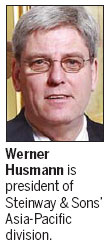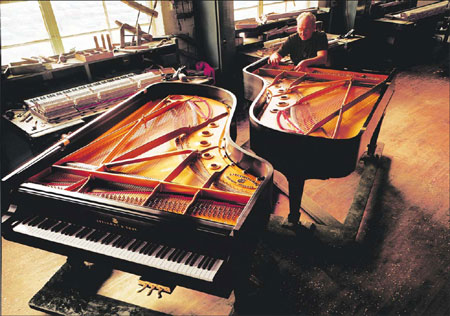For Steinway, it's rhapsody in red
Updated: 2012-11-09 15:48
(China Daily)
|
||||||||
Venerable piano maker that goes back nearly 160 years sees china as an important part of its future
Zhang Yuan, a 26-year-old Beijing resident who has been playing the piano for about 10 years, was on the verge of drooling over the Steinway in front of her. There was an ancient dragon logo on one side of the body. On the other were Chinese calligraphy carvings. The music stand took on the shape of a traditional Chinese fan, while the stool looked like a table for the guqin, a seven-string Chinese zither.
"I never dreamed Steinway would make a piano full of Chinese elements," Zhang says. "It's a fantastic combination of ancient China with the modern West."
The piano, called the Steinway & Sons' Charm of The Dragon, is the company's first joint project with Tian Jiaqing, an antique expert, and the first commemorative Steinway piano in China. Made especially to commemorate the Year of the Dragon this year, it sold for 6.9 million yuan ($1.1 million) at the China Guardian 2012 Autumn Auction in Beijing last month.
Sold through the Chinese mainland's oldest auction house, the piano is not simply a symbol of Steinway's growing popularity in the country, it represents a new path for the company as it seeks to expand in the world's second-biggest economy. About 5 million people in China play the piano, with the number growing by about 20 percent annually, says Feng Yuankai, deputy secretary-general of the China Musical Instrument Association.
"China is the future," says Werner Husmann, president of Steinway & Sons' Asia-Pacific division. "It has the fastest growth, and it is stable. So every dollar we're supposed to spend, it first of all will go to China."
Steinway & Sons, a 159-year-old company with headquarters in Hamburg and New York, has six divisions around the world. Sales last year reached $215.5 million for the company, which has 1,000 employees who make 2,000 pianos a year. It has a network of 23 dealers in China.
After its first foray into establishing a presence in China (in the form of a small office) in 1999, the company established Steinway Piano (Shanghai) Co Ltd in 2004. It now has a warehouse and distribution center that offers technical support and training for dealers and customers, says John Patton, president of Steinway Piano Shanghai. The company aims to spend more on advertising and promotions next year.
According to the 2011 annual report of the parent company Steinway Musical Instruments Inc, sales of Steinway grand pianos are critical to profits and have been greatly affected by the economic recession in Western markets. In China, Husmann says, the situation is different.
"We have grown on average by something between 14 to 16 percent every year," he says. China has recently surpassed the United States, the world's largest grand piano market, to become the top market for the most expensive Steinway pianos. Steinway grand pianos range in price from 680,000 yuan to 1.6 million yuan in China. Steinway's Crown Jewel collection of grand pianos sell for at least a million yuan and are experiencing annual growth of 20 to 30 percent on the mainland.
"In the past three years, we sold mostly Steinway special pianos, limited editions, Crown Jewels and customized art case pianos in China," Husmann says. "Our sales here are even more than in the US."
|
 |
Despite the slowdown in China's economy this year, the piano market has been stable, mostly because of increasing disposable incomes and more families and institutions buying high-quality pianos.
"In some surveys we did, many dealers told us that their sales revenue hasn't been affected, although the number of units has declined, because more people tend to choose pianos that are more expensive," Feng with the China Musical Instrument Association says.
Outside the realm of musical professionals, Steinway & Sons was virtually unknown in China when it arrived in the country, and Husmann says it has had a cautious growth.
"We didn't come to China to jump in, make a lot of money and go," says Husmann, also the managing director of Steinway & Sons Europe. "We wanted to develop this market. That takes time."
Husmann says people in China know Steinway mostly for its high prices, but few understand its philosophy of making the best piano possible. Thus, it has done a lot to educate dealers, technicians and consumers.

 Relief reaches isolated village
Relief reaches isolated village
 Rainfall poses new threats to quake-hit region
Rainfall poses new threats to quake-hit region
 Funerals begin for Boston bombing victims
Funerals begin for Boston bombing victims
 Quake takeaway from China's Air Force
Quake takeaway from China's Air Force
 Obama celebrates young inventors at science fair
Obama celebrates young inventors at science fair
 Earth Day marked around the world
Earth Day marked around the world
 Volunteer team helping students find sense of normalcy
Volunteer team helping students find sense of normalcy
 Ethnic groups quick to join rescue efforts
Ethnic groups quick to join rescue efforts
Most Viewed
Editor's Picks

|

|

|

|

|

|
Today's Top News
Health new priority for quake zone
Xi meets US top military officer
Japan's boats driven out of Diaoyu
China mulls online shopping legislation
Bird flu death toll rises to 22
Putin appoints new ambassador to China
Japanese ships blocked from Diaoyu Islands
Inspired by Guan, more Chinese pick up golf
US Weekly

|

|







